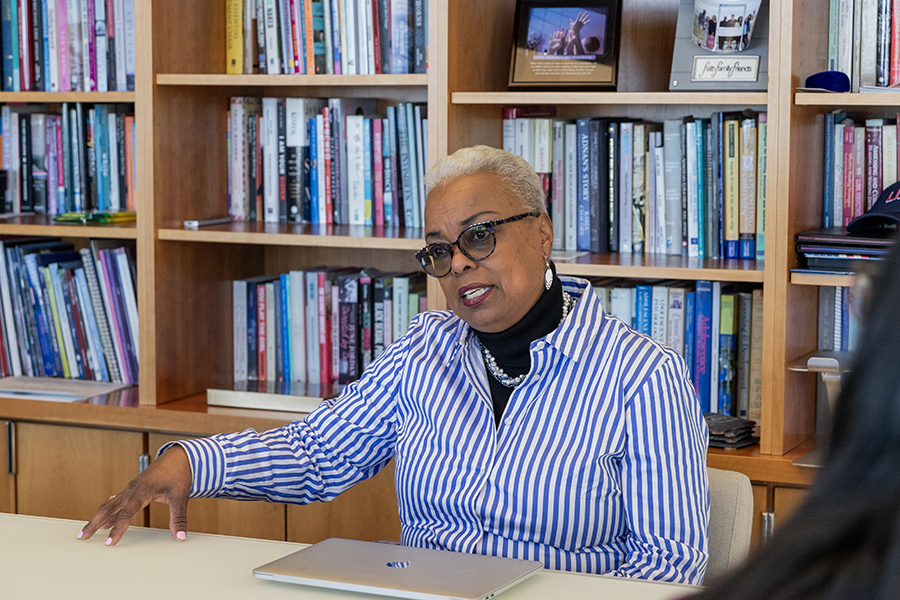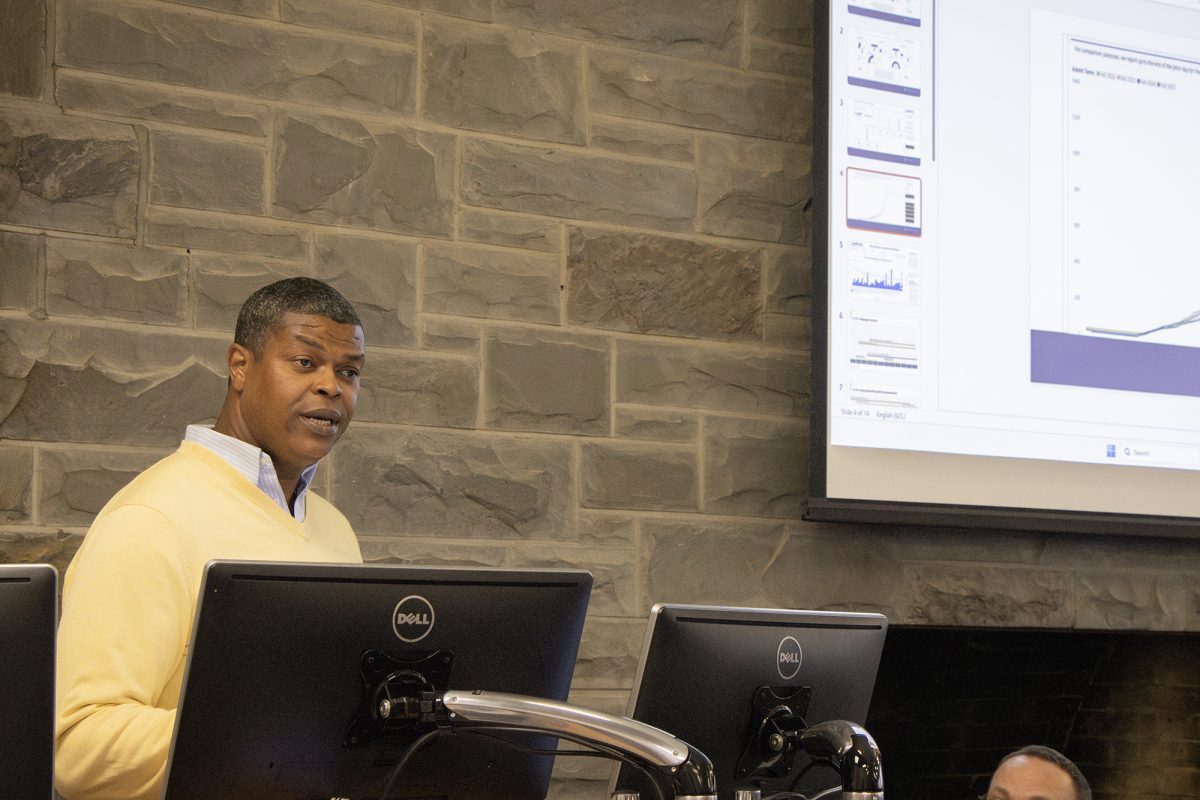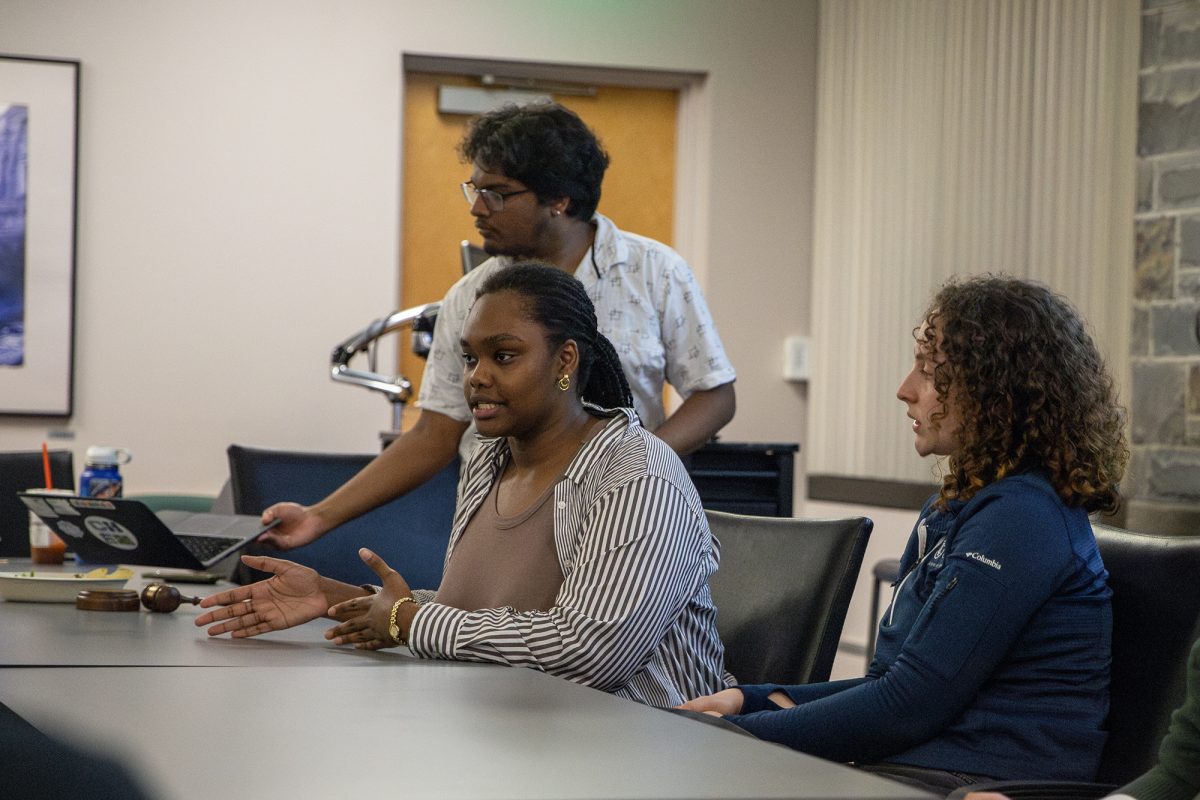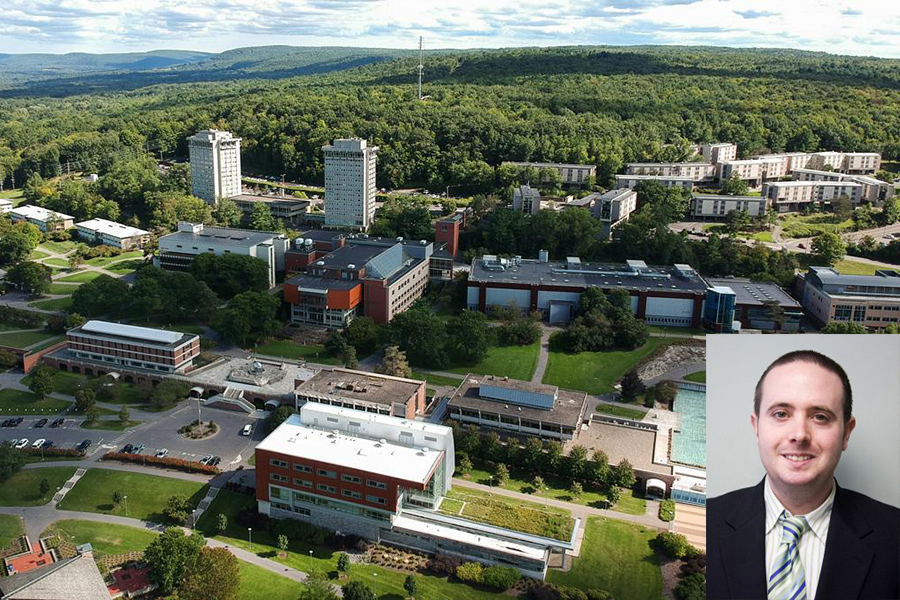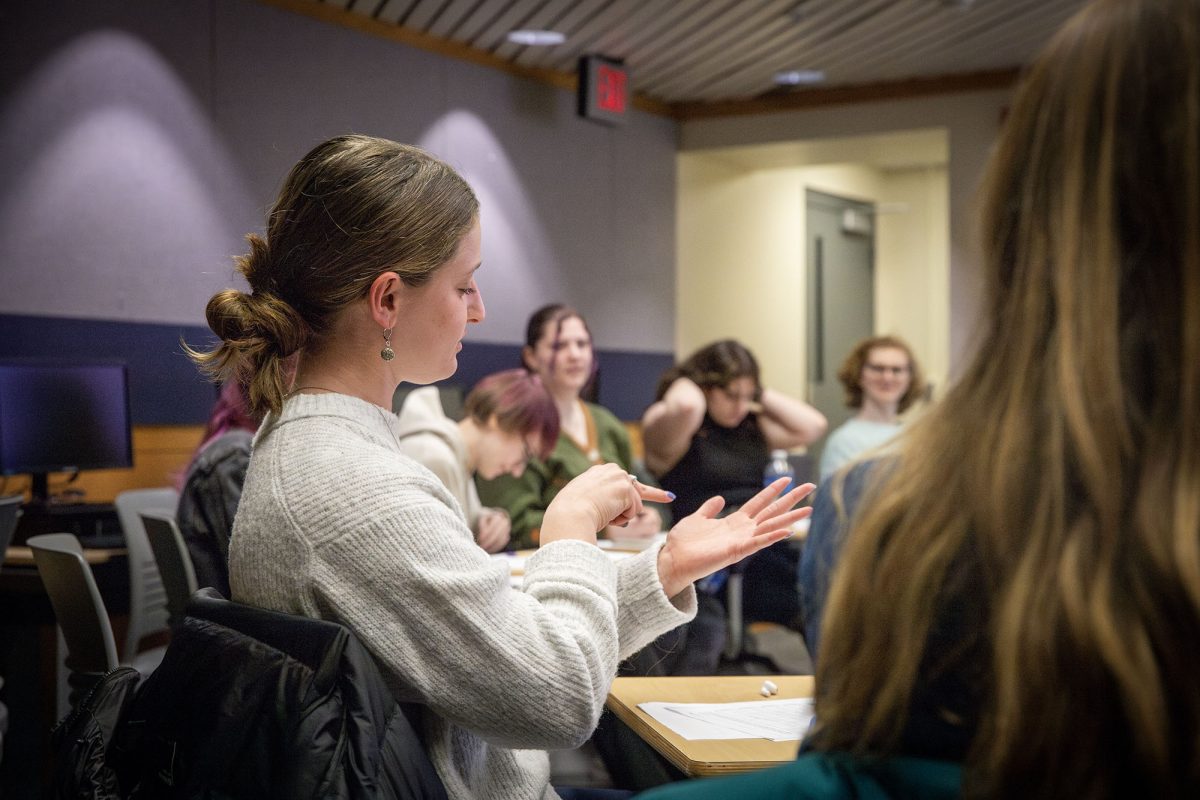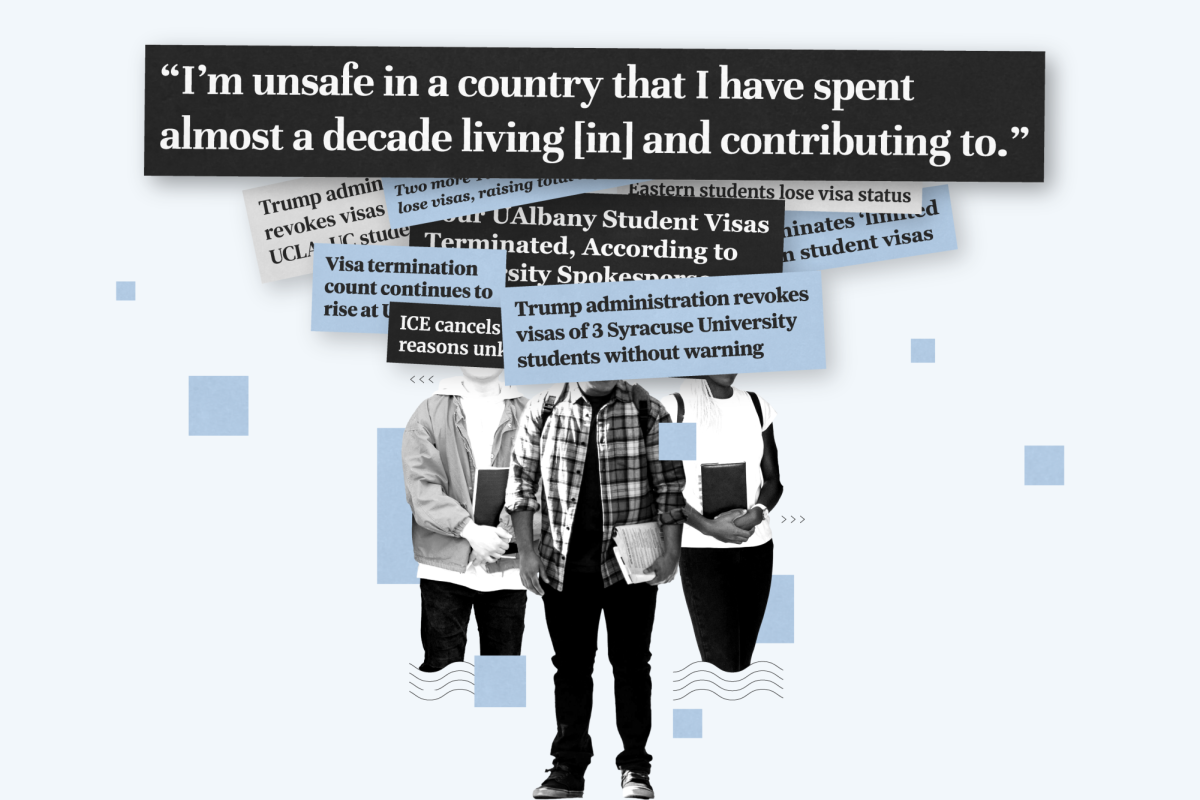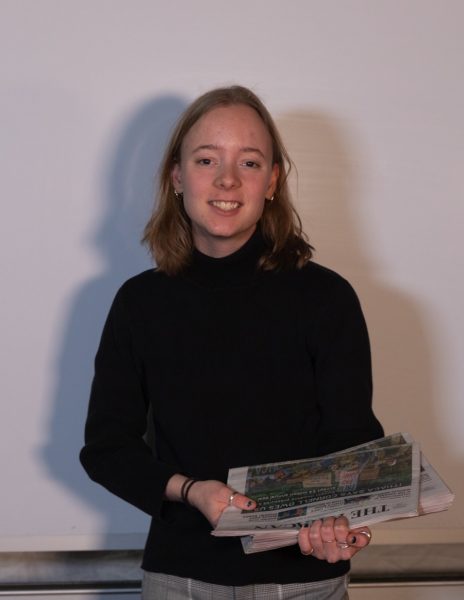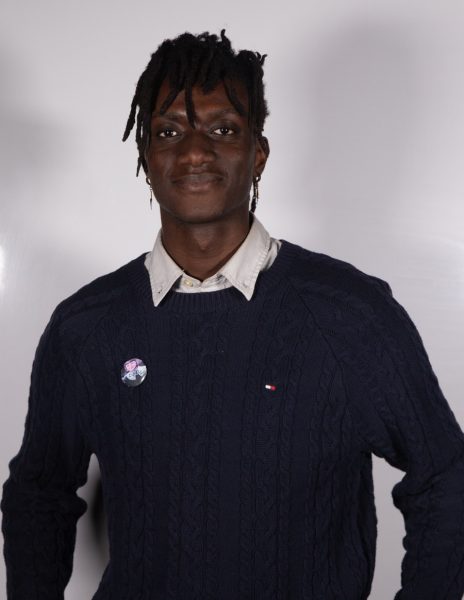Nearing the end of the 2023–24 academic year, The Ithacan sat down to talk with La Jerne Cornish, the 10th president of Ithaca College. Cornish is in her second year of the role, after previously serving as interim president for the 2021–22 academic year. She has also served as provost, executive vice president and senior vice president of academic affairs since she arrived at the college in 2018.
Editor-in-Chief Syd Pierre, Managing Editor Malik Clement and News Editor Prakriti Panwar sat down to talk with Cornish about the current campus climate, including free speech and diversity at the college.
This interview has been edited for length and clarity.
Campus climate and future plans
Syd Pierre: I know in the [campus climate] presentation today, they talked about how over half of the faculty said that they didn’t feel like the senior admin was taking their opinion seriously — what are your thoughts on that?
La Jerne Cornish: I’m grateful for the other half that thinks that we take their opinions seriously. There’s opportunity, there’s lots of opportunity for us to be better. And so I cannot ignore the data that says this is how faculty feel. Then the next thing we need to do is to have a conversation with faculty leadership, to discuss, you know, why they feel that way. And then how do we work together to improve our relationship?
SP: From what we’ve heard, some students feel like their programs on campus are shrinking and faculty are leaving or thinking about leaving and there’s turnover in those areas. So how does the college plan to maintain the integrity of the education?
LJC: Well, you know, our faculty is still stellar. We were just voted No. 1 in undergraduate teaching. I don’t think we were impacted by that with the quality of the programs that we offer. To me, they still remain stellar. We are a smaller school and we plan to be smaller. This is the result of the strategic planning process and the plan that we wrote and implemented in 2019. … Does that mean we have fewer resources and certain places? Yes, we do.
SP: I know the recent changes to Title IX are going to go into effect in August. Can you talk about how those changes might impact the campus community?
LJC: Well, Emily Rockett [vice president, general counsel and secretary to the board of trustees] and I are going to have a conversation about that really soon. So I can’t answer that today. But from what I’ve read, the thing I was most hopeful about was that the accused seem to have more rights prior and they have righted it, corrected that in the new regulations. So again, I need to know more, but I was happy to hear that they changed some of that.
SP: I know you talked about the strategic plan and we’re coming up on the fifth and final year of that. So what’s next after?
LJC: 2024–25 is our self-study for the Middle States [and] 2025–26 is our Middle States re-accreditation, so we will use those two years as a bridge to the next strategic plan. We have not accomplished all of the goals that were in the plan and, to be totally frank, that plan had nine goals — that is too many. If you’ve noticed, we’ve been focusing on maybe four of them a year and so we will continue to do that for the next several years. At the end of the day, financial sustainability is still a priority. Stabilizing our enrollment pattern is still a priority. Engaging our alumni and increasing philanthropy is still a priority. So those things can live for a few more years.
Free speech on college campuses
Prakriti Panwar: Being in higher ed, I’m sure you’ve heard about the state of college campuses across the country. A topic of conversation that keeps coming up right now is free speech. I am curious to know what your thoughts on that are and in what way you think free speech on college campuses is vital to the community.
LJC: I think I’ve been clear about this. You — The Ithacan — have recorded what I’ve said. I defend [and] I believe in the right to free speech, the right to freedom of expression, the right to protest. You know, we say we are a college rooted and grounded in the liberal arts tradition. [This] means that we teach our students to think critically, analytically, creatively, but we also expose our students to multiple perspectives in order to be a citizen of the world. You [have] got to hear diverse perspectives. And … free speech affords us the opportunity to hear diverse perspectives.
PP: You mentioned diverse perspectives — we do have a divided campus community as a result of the Israel-Hamas war, as is the case in a lot of other higher ed institutions as well. There’s a liberation zone at Cornell as we speak. Given the polarization that’s impacted our campus community, how would you address that specific divide?
LJC: I want us to continue to be in conversation with one another. I have said repeatedly [that] we can disagree without being disagreeable. Sometimes hearing your perspective either affirms my perspective or makes me say, ‘Maybe I need to change my thinking about this.’ But if I’m not hearing other perspectives, then it’s like being in an echo chamber. So how do we provide more opportunities to expose our students to diverse perspectives on this campus? Education is the key. I’m delighted with some of the work that’s been done by the history department to bring in diverse points of view. We’re talking about how do we develop a speaker series for next year to bring diverse voices to this campus and diverse perspectives.
SP: We’ve been seeing encampments and protests at other universities across the country. I know both you and Dave Maley, [director of public relations], touched on this on [April 20], but when would there be a situation where you feel like you need to kind of step in and take more action?
LJC: I encourage you to look at the policy manual, Section 2.31.1 [Freedom of Speech and Peaceful Assembly]. Read what it says about our commitment to free speech and how we gather what’s allowed and what’s not allowed. I don’t want to see anything get out of hand. I remember what it was like to be between the ages of 18 and 22. I protested in my life. That protest that happened on [April 20], while it upset some people, it was peaceful. They came in, they had signs, they laid down. They were peaceful. To me, that did not warrant force. Commencement is coming. Commencement is a private event, a ticketed event. If that is disrupted or interrupted, we will have to act and I need to be clear about that.
SP: I was curious from your personal standpoint, what you would want to see from The Ithacan in the coming years, coming semesters?
LJC: I just want to congratulate you on the changes I have seen in the paper in the time that I’ve been here. There has been less editorializing and more sticking with the facts. Was I happy to see the video of “Cornish, Cornish you can’t hide, you’re supporting genocide?” Does that hurt my heart? And I tear up when I talk about that, but you didn’t make it up. You reported it. Those are the hard parts of the job. When you believe in free speech, when you believe in freedom of expression, you may be defamed in the process, but I’m not going to stop it. Because I believe in those things. That was a tough pill and if you want to write that, you can. Being the president of all students, I worry about the leader of that organization because I know they’re getting some flack. Not kind things are being said about them on various sites. And so, you know, I worry about them too. So we need to do outreach because that person is a student here. Those students are our students. They are all our students. So how do we protect our students, even when we may not like what they’re doing? They are exercising their right, they are and so we have to protect everybody.
Diversity, equality and inclusion at the college
Malik Clement: What are some of the ways that you would look to address issues with diversity [and] equity, especially with things that took place with IC Rise Up and how difficult that was in general for the entire college community?
LJC: Having a Center for Equity, Inclusion and Belonging I think is fantastic. That is an outgrowth of something we’ve been trying to do for years and I’m satisfied that we are there now. There’s still more work to be done. But at least we have a dedicated person for students, a dedicated person for staff [and] a dedicated person for faculty. But this is an institutional issue. We’ve got work to do there. There’s still training that needs to take place across the board, but at least we have a place to start.
MC: How does the administration or even you go about addressing issues of discrimination on campus?
LJC: Oftentimes those specific issues don’t come to me, let me put it that way. But I think it’s important that we model that which we say we believe in. So if you look at my cabinet, the last two hires are African-American males. Prior to those hires, I was the only person of color on my cabinet. So if we say we want to be a model for colleges committed to the ideals of diversity, equity, inclusion and belonging, we need to model that which we say we value, and so we’re trying to model it if we say we believe in it.
MC: Do you have your own goals that you want to achieve in the coming years either with the Center for [Equity, Inclusion and Belonging] or just other representations of people of color within faculty and staff?
LJC: Could we have an increase of POC in our faculty and staff? Absolutely. You know, going back to the results of the Campus Climate Survey, knowing that students of color feel less comfortable on this campus is something we need to do something about. Knowing that faculty and staff of color feel less comfortable on this campus is something we need to do something about. Again, we have lots of opportunities. Let’s look at the data. Our campus has told us what we’re doing well and where we have challenges. Now, what plan can we make together to address those challenges knowing that there’s no magic pill. This work is not one-and-done work. So, what are we doing every year to not only live our values, but help folks know what the expected behaviors are as members of this particular community?


